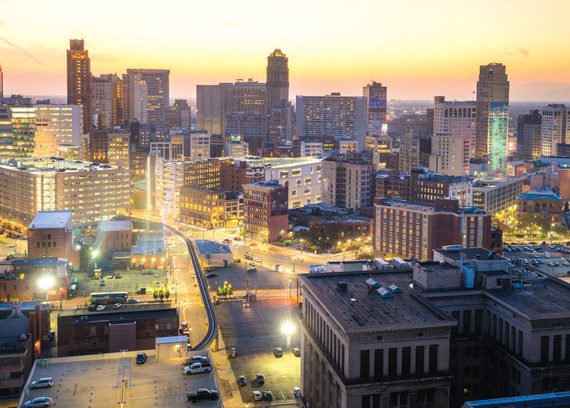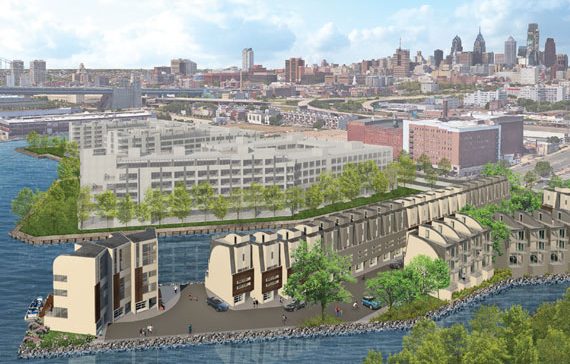

Napa, California
Napa Valley’s largest city has long been little more than a pit stop for tourists heading north to wine country destinations like St. Helena, Yountville and Calistoga. But following a 2015 river bypass project designed to control street flooding after heavy rains, the city of 80,000 is finally experiencing a surge of investment and development, the New York Times reported.
The downtown now has 65 restaurants and 24 wine-tasting cellars — a big jump from the single tasting room and 30 restaurants that existed two decades ago. And it will soon have many more. A 275,000-square-foot mixed-use development called First Street Napa is rising on three square blocks of the downtown. Anchored by the 183-room Archer Hotel, the $200 million project will have more than 40 spaces for retail outlets, offices and restaurants. Nearby, the Culinary Institute of America is opening an outpost dubbed the CIA at Copia. And Feast It Forward, an internet TV channel, is close to completing a farmhouse-style building that will feature live cooking demonstrations, wine, food and shopping. “People will finally take downtown Napa seriously,” Feast It Forward’s president, Katie Shaffer, told the Times.
Meanwhile, millennials have become a common sight on Napa’s downtown streets, and venues staying open until midnight, once unheard of in a sleepy area whose restaurants rarely served dinner, have become commonplace.
Some locals worry, however, that the new development will not only overwhelm the downtown’s one- and two-story architecture, but its workforce.
Patricia Damery, a ranch owner, told the Times that she was concerned Napa would suffer the same fate as other resort towns, with workers commuting long distances from the only areas they could afford to live in. “Downtown is wonderful and so much better than before, but we have to invest in quality-of-life things like mass transit and housing,” she said.

Detroit
Microsoft is moving its regional technology center to downtown Detroit from a nearby suburb, underscoring the downtown’s re-emergence as a regional business center decades after most companies fled to the suburbs, the Detroit News reports.
Microsoft signed a seven-year lease for more than 40,000 square feet in the One Campus Martius building. It’s unclear if it will maintain any presence in Southfield, Michigan — a loss lamented by the town’s mayor. Southfield’s vacancy rate now stands at 31.6 percent — one of the highest in the Detroit metro area — whereas downtown Detroit’s has fallen to 12.6 percent, a fourth-quarter report by JLL found.
“It’s more evidence Detroit is quickly becoming one of the technology centers of the country,” Dan Gilbert, the founder of mortgage lender Quicken Loans, who controls more than 90 properties downtown and has invested more than $2 billion in the city, told the paper.
In October, the Wall Street Journal reported that Bedrock Detroit, the development arm of Gilbert’s family of companies, was teaming up with watchmaker Shinola to build a 130-room boutique hotel with 17,000 square feet of retail space in the city center. The downtown’s hotel supply has stayed flat for virtually two decades.
Detroit’s beleaguered housing market has also received a shot in the arm from a partnership between Gilbert and the city that renovates and sells city-owned properties.

Philadelphia
The site of the failed Trump Tower Philadelphia skyscraper is back on the market for $12.3 million and comes with approved plans for a sprawling townhouse project along the Delaware River.
The developers — a joint-venture partnership called Shovel Ready Projects LLC — have secured permits for 41 homes on the 2.13-acre pier site, a spokesman for the company told the Philadelphia Inquirer. Plans for the four-story townhouses, designed by the local architecture firm Cecil Baker + Partners, call for each to be about 2,800 square feet.
More than a decade ago, the 45-story, $300 million Trump condo and hotel tower had been approved for the waterfront and scheduled for completion by mid-2008. But the financial crisis put that project on ice, and the site was sold by its mortgage holder to a Minneapolis-based sponsor for $86,300 in 2013.
Shovel Ready’s investors then bought the development site, known as Pier 35 , for $2.4 million in April 2015. “From a practical standpoint, while everybody liked the soaring prospect of some great waterfront tower thing, the reality is it’s an expensive proposition,” a Shovel Ready spokesperson told the Inquirer, adding that the buyer “will realize a nearly 40 percent return once all 41 townhomes are built and sold.” That is, if plans don’t change again.
The project lies within the boundaries of the Delaware River Waterfront Corporation’s proposed master plan, which includes building public parks as well as spurring residential, retail, hotel and maritime developments and opening up access to the waterfront.
A handful of national and foreign investors have already expressed interest in the Pier 35 site and are putting together bids, Curbed Philadelphia reported.

Atlanta
The Georgia Institute of Technology — also known as Georgia Tech — is seeking a developer to build a mixed-use project on 11.5 acres it owns in the West Midtown section of Atlanta. The project could include hundreds of apartment units, a hotel, offices and retail, according to the Atlanta Business Journal.

The project, at the corner of 14th Street and Howell Mill Road, would fill the last undeveloped site at the intersection. Over the past 20 years, the corridor has transformed from an aging industrial area to a booming dining, office and retail hub, following the redevelopment of early-20th-century warehouses into the Westside Provisions District.
Among the other projects planned for the neighborhood is a $210 million development being built by the Allen Morris Co., a Florida-based developer, and designed by architect Chad Oppenheim and Warner Summers Architecture. The development, according to the Business Journal, would include 409 apartments, 185,000 square feet of office space and 30,000 square feet of ground-floor retail. The surge in investment has prompted some to consider cashing out. The Atlanta Humane Society has retained Cushman & Wakefield to advise it on the possible sale of its 2.2-acre West Midtown campus, which local news outlets reported could fetch around $10 million.